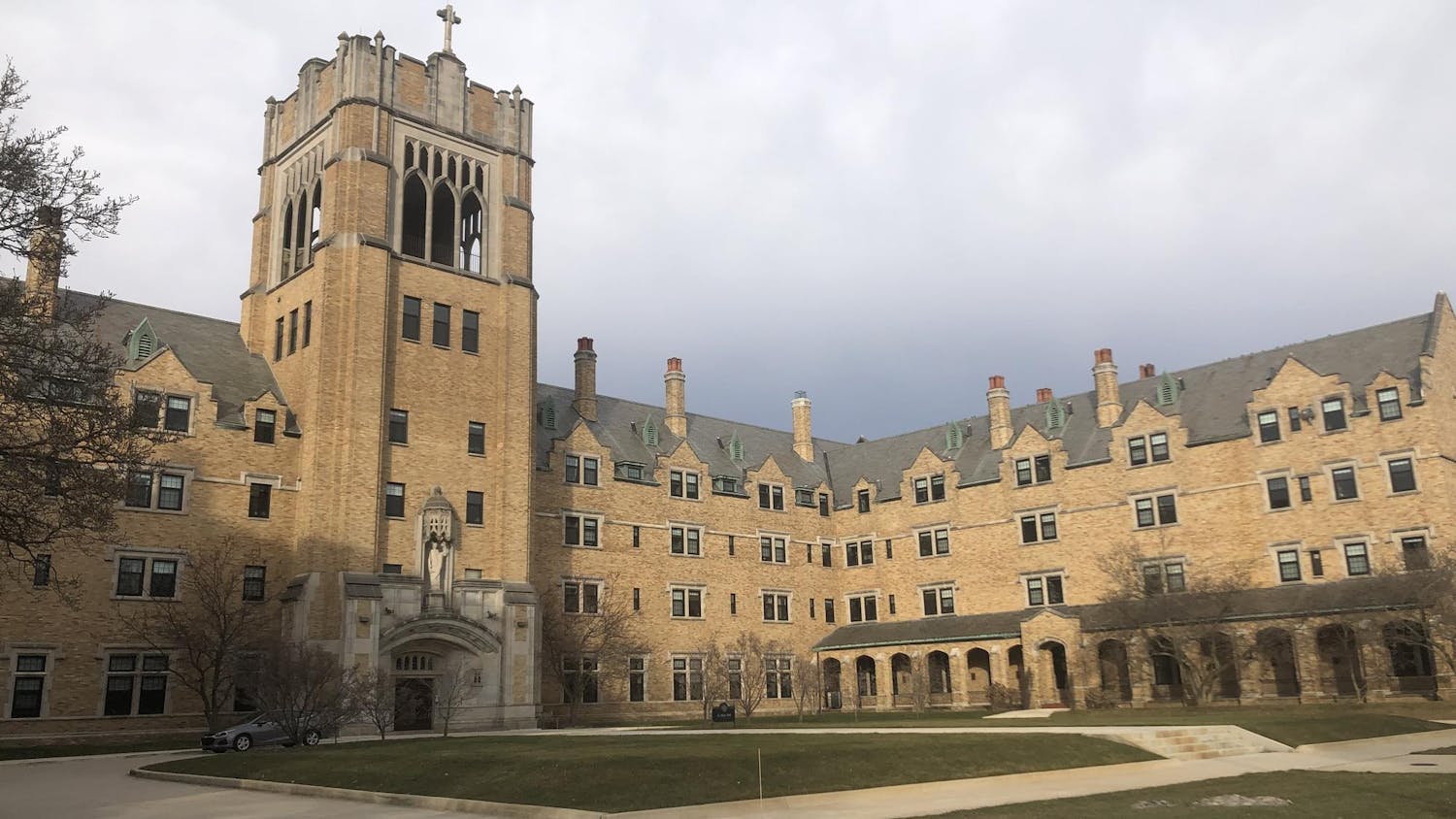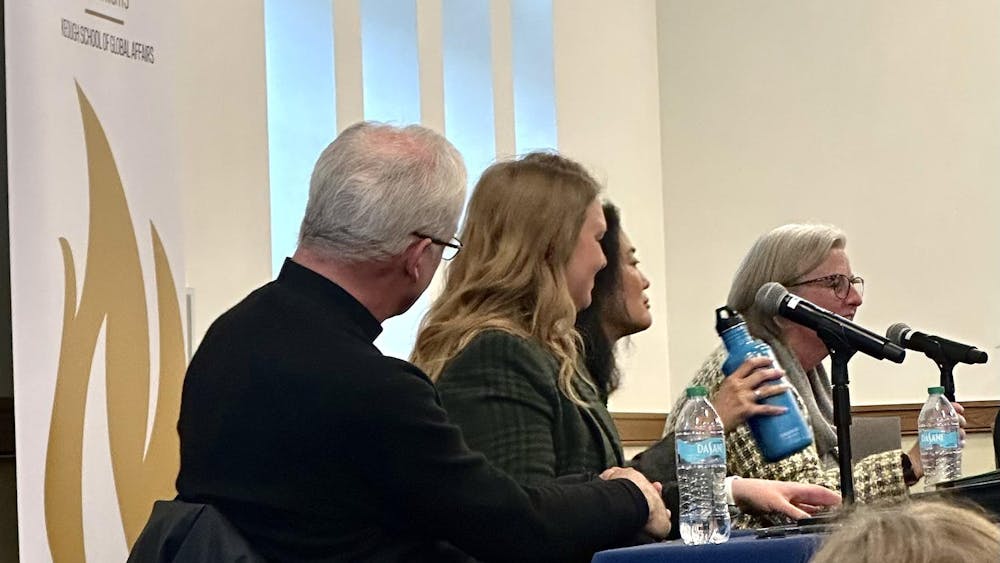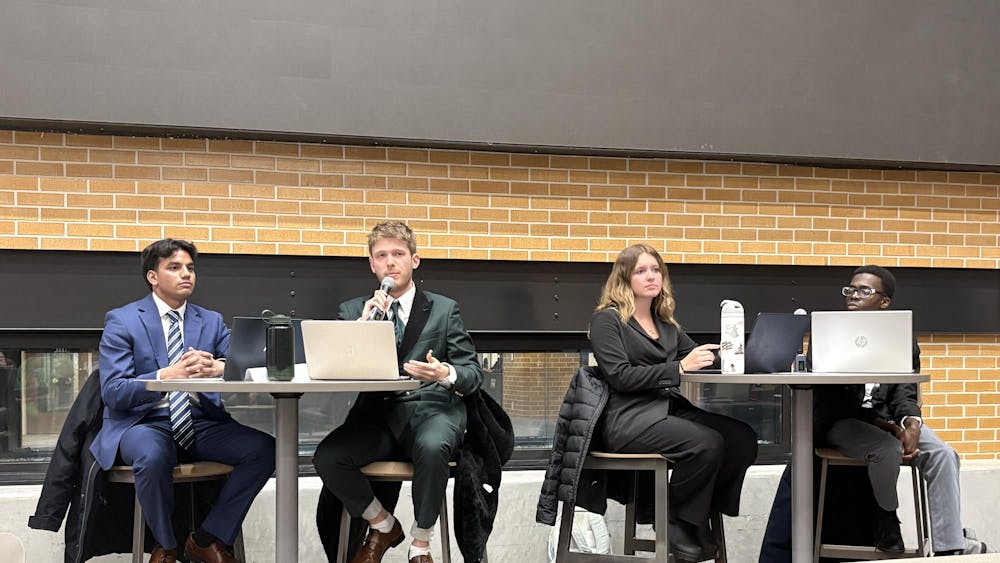On March 8, the Saint Mary’s community received an email from vice president for mission Julianne Wallace explaining that by June, the College would be restructuring the existing offices of Campus Ministry, the Office for the Common Good (OCG) and the Sustainable Farm into the newly established Center for Faith, Action and Mission (CFAM). Current director of campus ministry Nicole Labadie will serve as its inaugural director.
In the email, Wallace said the changes “will bring all of our programs in line with best practices and unify the work of our student-facing offices.”
Students gathered in Stapleton Lounge on Thursday night to hear more about how the reorganization would impact their experiences at the College and express their feelings about CFAM.
To open the evening, Wallace welcomed the audience and commended them for taking the time to give their feedback.
“I am so glad that each of you committed some time to be here tonight especially since this is the last time I’m going to talk in a public way about this,” she said. “But it was so important to me that I get your own feedback and input as we move forward as the Center for Faith, Action and Ministry.”
Before she began explaining how CFAM would function as an organization, Wallace acknowledged the support she received from President Conboy, her leadership team and Board of Trustees.
“I want to note that this center has the support of the president and her and the leadership team and the Board of Trustees,” she said. “I consulted with them all as we began this journey of discerning what this new organization would be for our students.”
Viewing a flow chart of the new structure of CFAM, Wallace addressed the two main areas of the organization that the director would be overseeing — justice and solidarity, and spiritual life.
“There will be times when these two areas work together,” she said. “There will be times when these two areas are doing different things just by the nature of the work and just by a way of providing accessible places for all of our students on campus.”
According to Wallace, the justice and solidarity division will be focused on continuing to connect with Academic Experiential Learning and community partnerships, expanding the capacity of the sustainable farm and implementing the College’s sustainability plan based in the “Laudato Si” encyclical.
The division plans to implement new programming that focuses more concretely on “providing experiences for students around contemporary issues in our world,” including immersion experiences locally, nationally and internationally, Wallace said.
“Those types of experiences that we want to embed in what you’re already studying so it’s not an add-on experience. It’s going to be a part of your college experience and it could be for-credit,” Wallace said. “This is something that we’re dreaming up together, hopefully with faculty and in partnership with our faculty colleagues.”
Additionally, Wallace described the spiritual life division as a place for any student, even if they are not Catholic.
“I want to be very clear that this isn’t guiding students in the Catholic life. This is guiding students in the spiritual life,” she said. “So if you are passionate about thinking about God in any way, in any context, there will be a way for you to explore that there will be a person on the team or a peer mentor or ministry assistant who will sit with you and talk about those deeper conversations about who God is and what God is and is there a God? This will be the place for those questions and that is welcome to anyone, at any time on our campus.”
The staff in the spiritual life division would be responsible for continuing to coordinate small faith groups, reinitiate spiritual pilgrimages the College led before the pandemic, hiring ecumenical, interfaith and lay female Catholic chaplains and bringing four part time priests to campus to meet student need, Wallace said.
To conclude the overview of the changes, Wallace noted that CFAM was still unclear about how they would organize themselves in the existing physical space currently designated for Campus Ministry and the Office for the Common Good student center. Wallace claimed once she received student input, CFAM would know how to update the offices.
“I think it’s important that you help us decide where we’re going to be and where you want us to be, so that’s going to be a conversation between the CFAM team, our student leaders and you,” she said. “Just give me input so that when you come back in the [fall], we’re ready to hit the ground running. It’s the space is going to look great. It’s going to be a welcoming space, it’s going to be a safe space, it’s going to be a brave space.”
Student reaction after the presentation of plan
Senior Libbey Detcher co-signed a recent letter to the editor to The Observer titled “Save the Office for the Common Good” with the rest of the student staff of the OCG. In it, they called for protecting the programs the OCG has to offer. Detcher spoke during the session about her disappointment in CFAM’s lack of student input."I was never asked for input as a leader for the OCG. My friends that are also in the OCG I don’t believe were asked for student input either,” she said. "And we believe that the reorganization of the division of mission will have severe consequences for community outreach, service and faith development at Saint Mary’s. As Saint Mary’s women, we will continue to stand up for what we believe to be right and just.”
After the session, Detcher noted the gathering was a move in the right direction, but not enough time was allotted to hear student perspectives.
“I think this was a step in the right direction. I really do,” she said. “I think it was good that we had a 15-minute listening session. However, it felt like we didn’t have enough time for them to only book the room for an hour and then reserve only 15 minutes for student input. I don’t think that was the right call for them.”
Junior OCG leader Jeanett Ochoa emphasized that the OCG does not directly operate under a faith-based mission, and the changes involved in the CFAM would isolate underrepresented students on campus.
“We minorities at SMC only have like one or two other offices, so adding faith to it ... that’s removing another resource for us,” Ochoa said. “So in a way this change is going to be very risky, and a way that we can fix it is to get more diverse staff.”
In response, Wallace noted a commitment to hiring diverse staff for open CFAM positions.
Sophomore OCG leader Valentina Rubio referenced the community partnerships created by current OCG director Rebekah Go, who will allegedly be demoted within the new CFAM structure.
In an interview with The Observer after the event, Wallace noted that “all members of the team were offered a position in the CFAM team, and they had the opportunity to choose to sign on.” When asked specifically about Go, Wallace stated she could not comment on personnel matters.
Others in the room, like senior Ashley Kraker, noted that the College needs to have Catholic values as a basis for the restructuring.
“I just think that as a Catholic school, we have a responsibility to share the Catholic faith and have that be the deepest core of everything that we do,” she said. “I think it’s wonderful that we are reorganizin,g because service is at the core of what the Catholic Church stands for. Service and then evangelization is really what this world needs right now.”
Junior Zahraa Mozan spoke about how after the Quran in the Saint Mary’s interfaith prayer room was damaged, it took the College a year to replace it due to issues with shipping. Because of this experience, Mozan questioned how she and other students of different faiths can feel safe on campus.
“My question is: How will I, as a student of color and student of a different faith, be guaranteed safety in a welcoming environment? Additionally, offices like OCG are a great resource, especially as a Muslim student, for me to just remove myself from religion for a little bit,” she said. “And having faith tied into this new structure will definitely push students away with myself, because they should not have to be included.”
Wallace noted after the event that a variety of perspectives were present at the event and described a hope for greater unity as a result.
“There has been a diversity of reactions from students, faculty and staff. You could hear it in the room tonight. There were people that were too Catholic. There were people that were not Catholic enough. And I think that’s a good indication that this is going to be a step forward,” she said. “That this is going to challenge many of us, but it’s going to lead to greater unity. It is going to lead to us recognizing our common bond a little bit better. And I think that’s going to just help us do the work better as a team.”
Wallace later clarified that she was not referring to the religion of the members of the student body, but rather the students' perspectives on how Catholic the College would become with the proposed changes to CFAM.
This report will be updated as more information is made available.









